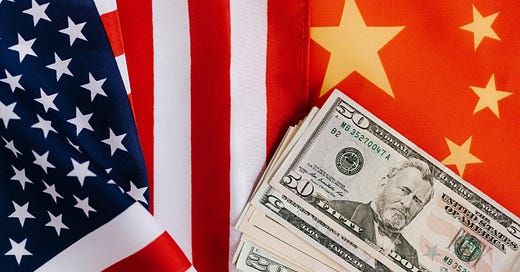Many western politicians have a great fear of the growing economy of China, and the power that economy gives them. China surpassed the US in economic out put 10 years ago, and it could reach twice what the US is producing as soon as 15 years from now, though longer is more likely. The standard of living in urban China will surpass the west even sooner. For example, household robots that the average Chinese apartment dweller can afford that take care of cleaning and such will be on the market there well ahead of here, and far cheaper than the western version. The price of labor-saving household gadgets in China is already less than the west and falling every year.
All of that, Western politicians see as a threat to their power, and it is. They won’t have the power to call terms to weaker countries anymore, and almost every sanction, one of their biggest tools, internationally, will no longer work at all. Further using sanctions will now cause more damage to their own economies than the sanctioned. It did in Russia and in parts of Africa, recently. But not only does it threaten western power on the international level, it threatens power locally. If “Chinese Peasants” have a better standard of living than people living in western cities, their local citizens are going to demand that those politicians fix it.
But fixing it would destroy their own power structure. The Chinese system concentrated on getting the product cheap enough for people to buy, not getting the people enough money to buy more. They are basically operating on their version of supply-side economics, and almost anything that increases the supply is a good thing. The way the Chinese are doing it has big problems, but it is getting the job done better than the ones the West uses currently. But even if they adopted that, the Chinese standard of living will still exceed the West. Chinese build bigger cities. Bigger cities take more infrastructure. More infrastructure means a higher standard of living, even when the two have the same level of technology and economic development. That is just how the numbers work out.
A few see war as an option for slowing that down. Tactically, that may or may not work, their infrastructure is easier to target than most of what is in the US and EU. But it will not be worth it either way; the damage would be massive even without nukes. Others see rebuilding our trade relations with Africa, Russia and the Middle East as the better option. The sanctions we have in place accelerate how fast China’s economy is growing. As much as one percent of that yearly growth resulted from western sanctions, on Russia and others, while harming western economies, making them less able to compete. The thinking is, if we stop adding to their growth, and harming ours, those problems that they do have with their system become unmanageable, and that system will collapse.
That may or may not be true, but they will play a more important role without those sanctions offsetting them. The Chinese system has many problems, and some are only going to get worse with time. Fixing the economies of the cities where most people live has only a limited effect on the rural economies. The short-term subsidizing to grow companies results in a higher failure rate of companies that grew too big too fast, putting large numbers of people out of work and having to change jobs. Then there is their ageing population problem, it is going to get even worse than the western one.
For what it is worth, that is how I see it. How do you see it?




